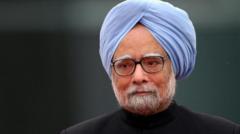Former Indian Prime Minister Manmohan Singh, known for his significant role in liberalizing India's economy, has passed away at the age of 92 following complications with his health. His contributions have left a lasting impact, despite being embroiled in political controversies during his tenure.**
Former Indian Prime Minister Manmohan Singh Passes Away at 92**

Former Indian Prime Minister Manmohan Singh Passes Away at 92**
Manmohan Singh, regarded as the architect of India's economic reforms, has died, leaving behind a legacy of transformation and controversy.**
Former Indian Prime Minister Manmohan Singh has passed away at the age of 92 after a decline in his health, making headlines as one of India's pivotal political figures. His premiership from 2004 to 2014, along with his previous role as finance minister, positioned him as the architect of crucial economic reforms that transformed India's landscape.
Born on September 26, 1932, in a small village in the Punjab region of what is now Pakistan, Singh's early life was marked by poverty and hardship. He pursued higher education at Panjab University, followed by postgraduate degrees at the University of Cambridge and a DPhil from Oxford. His upbringing instilled in him a strong sense of duty and resilience.
Singh's iconic ascent began in 1991 as finance minister during a time of economic crisis. His strategies, which included tax cuts, a devaluation of the rupee, privatization, and encouragement of foreign investment, revitalized India's struggling economy, setting the stage for rapid growth in the following decades.
Dubbed the "Accidental Prime Minister," Singh was chosen by Congress president Sonia Gandhi to lead the country after she declined the position. This unique political circumstance fueled perceptions that he lacked direct authority. Despite these challenges, Singh guided India through significant achievements, including a landmark nuclear deal with the United States, although his later years in office were plagued by numerous corruption scandals that tarnished his administration's reputation and led to a notable electoral defeat in 2014.
A consensus builder, Singh was often praised for his integrity and intellect but criticized for his perceived indecisiveness. He steered the country through various foreign policy challenges, balancing relations with both Pakistan and China while supporting Afghanistan.
Post-premiership, Singh remained engaged in political discussions, notably addressing key economic issues arising from the COVID-19 pandemic. Despite being a low-profile leader known for few public words and a modest online presence, his influence on India's economic policies will endure.
Manmohan Singh is survived by his wife Gursharan Kaur and their three daughters, leaving behind a complex yet impactful legacy in Indian politics.


















